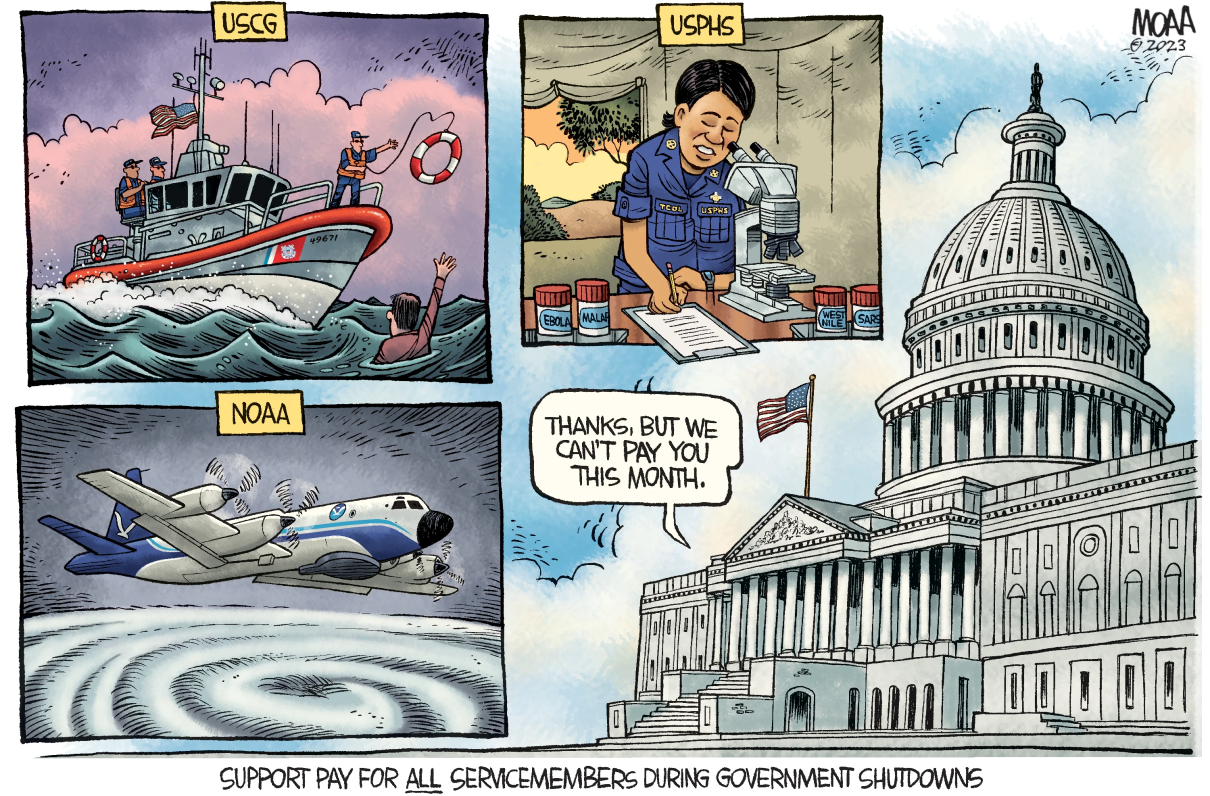Update: A 45-day continuing resolution became law Sept. 30, keeping the government funded through mid-November. Send a message through MOAA's Legislative Action Center and tell your lawmakers to finish the budget process and ensure servicemembers are paid should a deal not be reached.
Get the latest updates from MOAA on the budget process via our Advocacy News page, or by subscribing to the weekly edition of The MOAA Newsletter.
Sept. 30 marks the last day legislators will have to pass the appropriations federal agencies will need to operate properly. Failure to do so could result in a government shutdown.
But even if Congress passes a continuing resolution to keep the lights on and the doors open, it is still a failure of governance by our lawmakers. Constituents should not need to beg their elected officials to fulfill their constitutional obligations and pass timely appropriations. Servicemembers, veterans, their families, and survivors need and deserve better.
[TAKE ACTION: Urge Your Lawmakers to Pass a Continuing Resolution and Follow Up With a Proper Budget]
Of the 12 appropriations bills needed to fund the government, only one had passed a single chamber of Congress as of Sept. 13, according to the Congressional Research Service – the House version of appropriations for military construction and the VA, which passed 219-211 in July. While the lack of progress for appropriations is disheartening, MOAA will remain focused on servicemembers and their families. We will continue to urge lawmakers to resolve partisan differences outside of the FY 2024 National Defense Authorization Act (NDAA) and requisite appropriations.
Past, present, and future servicemembers deserve our nation’s support for uninterrupted compensation and benefits like high-quality housing and health care for themselves and their families.
“When our nation’s elected leaders fail in these core responsibilities, it sends a negative message to those in uniform, to veteran and family influencers, as well as directly to those who may consider joining,” said Lt. Gen. Brian T. Kelly, USAF (Ret), president and CEO of MOAA. “These are bad messages anytime but are particularly impactful during our current recruiting crisis. We don’t need our elected leaders perpetuating and adding to negative perceptions that ultimately dissuade service and threaten our nation’s security.”
What’s Next
Until Congress passes the necessary appropriations bills, federal agencies overseeing the uniformed services and veteran communities will lack the funding and authorities needed to maintain an all-volunteer force. Along with the military construction-VA funding mentioned above, MOAA continues tracking the defense appropriations bill, which sets the DoD budget. That legislation was marked up by the House and Senate on June 14 and June 22, respectively.
While Congress works on appropriations bills, lawmakers also are pushing forward with authorization legislation. The NDAA is the most critical of these authorization bills for MOAA’s purposes, as it affects DoD policies and programs. Both the House and the Senate have passed their respective versions of the NDAA; the next step in the process is for Congress to sort out the differences in the two bills via conference committee.
Timely appropriations have been an ongoing struggle. For more than a quarter-century, the federal government has failed to enact the necessary legislative measures to properly fund itself before the Sept. 30 deadline. Tell your lawmakers it’s time to act.
Be sure to read The MOAA Newsletter (manage your newsletter preferences at this link) and visit MOAA.org for the latest updates on the NDAA and MOAA’s other advocacy initiatives.
More Members Mean More Influence Over Retirement Pay, Health Care, and Family Programs
Get involved and make sure your interests are addressed. Because the larger our voice is, the greater our impact will be.



